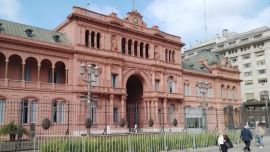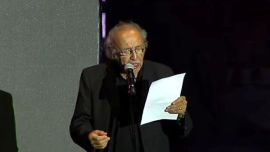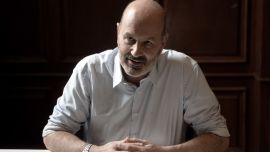While still looming on some horizon, Argentina’s economic crisis grows less asymptomatic all the time with the forecasts for this year’s inflation creeping ever closer to three digits while the Central Bank has posted the biggest quasi-fiscal deficit since the 2001-2002 meltdown (even if the fiscal deficit remains within International Monetary Fund parameters for now, with the help of some creative accountancy). And yet the political world has yet to offer any answers to this urgently central question with no reasonable plan in sight or even an unreasonable one – thus a freeze lost ground in both technical and symbolic terms last week with the resignation of Domestic Trade Secretary Roberto Feletti, while President Alberto Fernández dropped his plans for marking last Wednesday’s national day in the Antarctic in favour of the more traditional Te Deum in this capital.
Instead of seeking any consensus to confront this impending national emergency, the political spectrum is increasingly fragmented at various levels – whether ideological approaches, electoral strategies or choice of issues – with today’s Radical national convention in the Buenos Aires provincial capital of La Plata a case in point. Within a precariously united Juntos por el Cambio opposition coalition, the Radicals have their own factional divisions – a traditional line under the party’s provincial governors, a more technocratic wing under Senator Martín Lousteau and the 21st century vision of the ambitious neurosurgeon Facundo Manes. At the tactical level the Radicals face a crossroads – do they cleave to the Juntos por el Cambio opposition within the grieta polarisation or do they aim for the middle ground fishing for independent voters and weaning away moderate Peronists from the Kirchnerite rump of the ruling coalition along the lines of Mauricio Macri’s 2019 running-mate Miguel Angel Pichetto (not that Pichetto favours the Radical red within the opposition palette), especially if their PRO partners continue inching towards the right in order to meet the challenge of Javier Milei’s libertarians?
The combination of internal divisions and an uncertain future conspire against any opposition consensus towards the economic plan openly disavowed by President Fernández. In the default of any plan, political debate clusters around an agenda of issues like the single ballot and the Council of Magistrates which, whatever their institutional importance, only increase the distance separating the political class from an increasingly scornful population.
Meanwhile the government is being schizophrenic even in its disunity. On the one hand, Feletti’s resignation sends a very clear message that when the going gets tough, the toughest (in the person of the ruling coalition’s Kirchnerite wing) get going – in the opposite direction, in order to build a future without the burden of any responsibility for current failings. But on the other hand, the adverse course of events is increasing the pressures on President Fernández to include the other wings of Frente de Todos in the more executive aspects of the executive branch instead of pursuing his own ideas on economic or international policies with his personally handpicked ministers. In other words, at the same time that Feletti walks out the door, Vice-President Cristina Fernández de Kirchner and Congress Speaker Sergio Massa (both of whom reportedly aspire to accompany an increasingly isolated President Fernández at the decision-making helm) would each like to see their own choices of officials entering.
The crisis remains asymptomatic for now with strong consumer growth posted for the first quarter and IMF approval of fiscal performance thus far but winter is now only three weeks away and the changes may well be more than seasonal as the harvest export dollars recede and the energy import bills mount, abruptly changing the balance of trade – and with it the supply of dollars on which the economy is based far more than the nominal currency (despite the new banknote designs flagged in the past week). Most of the general public is all too aware of the situation (or at least of inflation) but is there any chance of today’s national convention in La Plata or the political world in general paying any heed?


















Comments